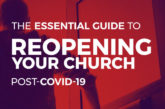Confession is a Sacrament instituted by Jesus Christ in his love and mercy. It is here that we meet the loving Jesus who offers sinners forgiveness for offenses committed against God and neighbor. At the same time, Confession permits sinners to reconcile with the Church, which also is wounded by our sins.
Through this Sacrament, we meet Christ in his Church ready and eager to absolve and restore us to new life. The graces of Christ are conferred in the Sacraments by means of visible signs – signs that are acts of worship, symbols of the grace given and recognizable gestures through which the Lord bestows his gifts. In the Sacrament of Penance, the forgiveness of sins and the restoration of grace are the gifts received through the outward sign, i.e., the extension of hands and words of absolution pronounced by the priest.
How do I prepare for Confession?
Confession is not difficult, but it does require preparation. We should begin with prayer, placing ourselves in the presence of God, our loving Father. We should harbor in our hearts a sense of sorrow for all we have done. The motivation for our sorrow may be out of love of God or even fear of the consequences of having offended God. Whatever the motive, contrition is the beginning of forgiveness of sin. We need to have sorrow at least to the extent that we regret it, resolve not to repeat it and intend to turn back to God.
With this disposition of heart, we should review our lives since our last confession, searching our thoughts, words and actions to discover those that did not conform to God’s love, to his law or to the laws of the Church. This is what is known as an “Examination of Conscience.” (Scroll down for an examination of conscience)
How do I go to Confession?
The following may be helpful in preparing for confession. Above all, do not be afraid. If you are hesitant about what to do, ask the priest for help:
- Greeting: The priest welcomes the penitent warmly and greets him or her with kindness.
- Sign of the Cross: Then the penitent makes the Sign of the Cross, which the priest may also make.
- Confession of Sins and Acceptance of Satisfaction: The penitent confesses his or her sins and accepts the prayers or deeds that the priest proposes as a penance.
- Prayer of the Penitent and Absolution: The priest asks the penitent to express sorrow by praying one of the prayers found in the ritual or in his or her own words. The priest then prays the Prayer of Absolution, to which the penitent responds: “Amen.”
- Proclamation of Praise and Dismissal: The priest continues: “Give thanks to the Lord, for he is good.” The penitent responds: “His mercy endures for ever.” The priest then dismisses the penitent, using one of the formulas found in the ritual.
How often should I go to Confession?
Individual and integral confession remains the only ordinary way for us to reconcile ourselves with God and the Church. A Catholic who has committed mortal (grave) sin is obliged to seek God’s forgiveness in this Sacrament as soon as possible.
In ordinary circumstances, a Catholic who has committed mortal sin should not receive Holy Communion before receiving Sacramental absolution. Not only does God forgive our sins, but we also receive the power of God’s grace to struggle against sin and to be strengthened in our commitment to God and the Church. So powerful is the grace of this Sacrament that the Introduction to the Rite of Penance reminds us that frequent and careful celebration of this Sacrament is also very useful as a remedy for venial sins. This is not a mere ritual repetition or psychological exercise, but a serious striving to perfect the grace of baptism so that, as we bear in our body the death of Jesus Christ, his life may be seen in us ever more clearly.
Examination of Conscience
1. I am the Lord your God.You shall not have strange gods before me.
Do I give God time every day in prayer?
Do I seek to love Him with my whole heart?
Have I been involved with superstitious practices or have I been involved with the occult?
Do I seek to surrender myself to God’s Word as taught by the Church?
Have I ever deliberately told a lie in Confession or withheld a mortal sin from the priest?
2. You shall not take the name of the Lord your God in vain.
Have I used God’s name in vain: lightly or carelessly?
Have I been angry with God?
Have I wished evil upon any other person?
Have I insulted a sacred person or abused a sacred object?
3. Remember to keep holy the Lord’s Day
Have I deliberately missed Mass on Sundays or Holy Days of Obligation?
Have I not done due diligence to find a Church when traveling?
Do I get to Mass late or leave early?
Do I pay attention when I am at Mass?
Do I talk unnecessarily in Church?
Have I not kept Sunday as a family day and a day of rest?
Do I do needless work on Sunday or do I make others work on Sunday?
4. Honor your father and your mother.
Do I honor and obey my parents?
Have I neglected my duties to my spouse and children?
Have I given my family good religious example?
Do I try to bring peace into my home?
Do I care for my aged and infirm relatives?
Do I respect my elders?
Do I respect my pastor, my bishop, and the Pope?
Do I respect anyone who has authority over me: boss, supervisor, police, etc.?
5. You shall not kill.
Have I had an abortion or encouraged anyone to have an abortion?
Have I physically harmed anyone?
Have I destroyed, or sought to destroy, another’s reputation by gossip?
Have I abused alcohol or drugs?
Did I give scandal to anyone, thereby leading them into sin?
Have I been angry or resentful?
Have I harbored hatred in my heart?
Have I been sterilized for reasons of birth control?
Have I encouraged or condoned sterilization?
6. You shall not commit adultery.
Have I been faithful to my marriage vows in thought and action?
Have I engaged in any sexual activity before marriage or outside of marriage?
Have I used any method of contraception or artificial birth control?
Has each sexual act in my marriage been open to the transmission of life?
Have I respected all members of the opposite sex, or thought of other people as objects?
Have I been guilty of any homosexual activity?
Do I seek to be pure in my thoughts, words and actions?
Am I careful to dress modestly, so as not to tempt others?
Have I been guilty of masturbation with myself?
7. You shall not steal.
Have I stolen what is not mine?
Have I returned or made restitution for what I have stolen?
Do I waste time at work, school or at home?
Do I get to work late or leave early but earn a full paycheck?
Do I gamble excessively, thereby denying my family of their needs?
Do I pay my debts promptly?
Do I seek to share what I have with the poor?
8. You shall not bear false witness.
Have I lied?
Have I gossiped?
Have I harmed someone’s reputation?
Have I spoken behind someone else’s back?
Am I critical, negative, or uncharitable in my thoughts of others?
Do I keep secret what should be kept confidential?
Have I spoken inappropriately of others ethnicity, race or religion?
9. You shall not desire your neighbor’s wife.
Have I consented to impure thoughts?
Have I caused them by impure television, movies, book, magazines or internet?
Do I pray at once to banish impure thoughts and temptations?
Do I listen to, or engage in, impure conversations or jokes?
10. You shall not desire your neighbor’s goods.
Am I jealous of what other people have?
Do I envy other people’s families or possessions?
Am I greedy or selfish?
Are material passions the purpose of my life?
Do I trust God will care for all of my material and spiritual needs?
This Examination of Conscience is meant to be a help in making a good Confession. It is not an exhaustive list but should help you to properly prepare for the Sacrament of Confession.
Act of Contrition
O my God, I am heartily sorry for having offended you, and I detest all my sins because I dread the loss of heaven and the pains of hell; but most of all because they offend you, my God, who are all good and deserving of all my love. I firmly resolve with the help of your grace, to confess my sins, to do penance and to amend my life. Amen.



